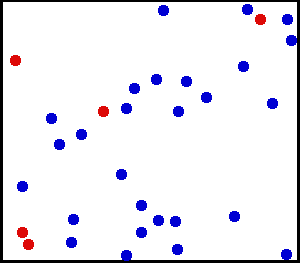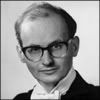I can't get across what I'm trying to say more effectively than this:
Time is very simple, once you get it. But “getting it†is very difficult. That’s because your current concept of time is so deeply ingrained. You form a mental map of the world using your senses and your brain. You use this mental map to think, and you are so immersed in it that you can’t see things the way they really are. You are locked into an irrational conviction that clocks run, that days pass, and that journeys take a length of time.

It takes an open mind, and logic to break out of this conditioning. First of all we need to look at your senses and the things you experience. Let’s start with sight. Look at the picture below:

The central portions of the two crosses are the same colour. You think the one on the left is blue or grey and the one on the right is yellow. Not true. Tear a small hole in a piece of paper to make a peephole to mask out the context. Hold it up to one image after the other, and you realise that the central portion of the right-hand image really is grey. The yellow was the illusion. What does this tell you? It tells you that something you took for granted is not true. And it should remind you that a photon doesn’t have a colour. It has a wavelength, an oscillation,
a motion.
Link
Let’s move on to sound. Imagine a super-evolved alien bat with a large number of ears, like a fly’s eye. This bat would “see†using sound, and if it was sufficiently advanced it might even see in colour. But we know that sound is pressure waves, and when we look beyond this at the air molecules, we know that sound relies
on motion.

Pressure is related to sound, and to touch. You feel it in your ears on a plane, or on your chest if you dive. You can feel it when I shake your hand. But you know you can’t measure the pressure of an atom, because pressure isn’t a fundamental property of the sub-atomic world. It’s a derived effect, and the Kinetic Theory of Gases tells us
it’s derived from motion.
How about kinetic energy? A cannonball in space travelling at 1000m/s has kinetic energy. If it impacted your chest you would feel it. But apologies, my mistake. It isn't the cannonball doing 1000m/s. It's you. So where's the kinetic energy now? Can you feel it coursing through your veins? No. Because what’s really there is mass, and
relative motion.
You can also feel heat. Touch that pretty stove and sizz, you feel heat. We talk about heat exchangers and heat flow as if there’s some magical mysterious fluid in there. And yet we know there isn’t. We know that heat is
another derived effect of motion.

Taste is chemical in nature, and primitive. Most of your sense of taste is really your sense of smell. Do you know how smell works? Look up olfaction and you’ll learn about molecular shape. But the latest theory from a guy called Luca Turin says it’s all down to molecular vibration, not shape, because isomers smell the same. That’s
motion again.
The point of all this is there’s a lot of motion out there, and most of your senses are motion detectors. But it never occurred to you because you’re accustomed to thinking about the world in terms of how you experience it, rather than the scientific, empirical, fundamental, ontological things that are there. And nowhere is this more so than with time.
So, what is time? Let’s start by looking up the definition of a second:
Under the International System of Units, the second is currently defined as the duration of 9,192,631,770 periods of the radiation corresponding to the transition between the two hyperfine levels of the ground state of the caesium-133 atom. This definition refers to a caesium atom at rest at a temperature of 0K…
So, a second is nine billion periods of radiation. Now, what’s a period? We know that radiation is basically light, so let’s have a look at frequency:
Frequency = 1 / T and Frequency = v / λ
So frequency is the reciprocal of the period T, and also velocity v divided by wavelength λ. No problem. Flipping things around, we see that period T is wavelength λ divided by velocity v. We know that a wavelength is a distance, a thing like a metre:
The metre is the length of the path travelled by light in vacuum during a time interval of 1/299792458 of a second...
And we all know that velocity is a distance divided by a time. So a period is a distance divided by a distance divided by a time. The result is another period of time. This definition of time is circular and tells us nothing. How do we define it? Let’s look at frequency again:
Frequency is the measurement of the number of times that a repeated event occurs per unit of time.
So frequency is a number of events per second. And a second is a number of some other events. The interval between events is measured in terms of other events. And the interval between those events is measured in terms of other events. Until there are no events left, only intervals. And intervals are frozen timeless moments. For time is a measure of events, of change, measured by and against some other change. And for things to change, something, somewhere, somehow, has to have motion.
You don’t need time to have motion. You need motion to have time.
We measured nine billion oscillation events and defined that as a second. We counted events. We counted motions. One, two, three, four, five… nine billion. Mark that down as a second. But you don’t have to count the motion in an atomic clock. You could count beans in a bucket. Ping, ping, ping, chuck them in, regular as clockwork.

You’re sitting there counting beans into the bucket, ping, ping, ping. Now, what is the direction of time? The only direction that is actually there, is the direction of the beans you’re throwing. “Fuller Bucket†is not the direction of time. “More Beans" is not the direction of time. The direction of your time is the direction of your counting, and I could have asked you to count them out of the bucket. There is no “Arrow of Beansâ€. There is no “Arrow of Timeâ€. That’s just an illusion, as imaginary as the direction you take when you count along the set of integers.
1 2 3 4 5 6 7 8 9 10 11 12 13 14 15 16 17 18 19 20 21 22 23 24 25 26 27 28 29 →
So why do we say things like Clocks slow down as if a clock is something that moves like a car? It isn't travelling. There's no slow or fast or up or down to it. We say the day went quickly but we know it didn’t go anywhere, and it didn’t go quickly at any speed at all. It isn’t travelling and there is no direction. The only directions that are there, are the directions of the motions that make the events that we use to measure the intervals between the other events. And they’re being counted, incremented, added up. We count regular atomic motion to use as a ratio against some other motion, be it of light, atoms, clocks, or brains. All of these things have motion, both internal motion and travelling motion. And all those motions are real, with real directions in space, ending in the sameness we call entropy. But the time direction isn't real. It's as imaginary as a trip to nine billion.
That's why the past is only in your head and your records. It isn’t a place you can travel to. It’s the places where things moved from. All those places are still here, now. And while the past is the integral of all nows, now lasts for no time at all. Because time needs events, and if there were only intervals and no events, there wouldn’t be any time. When you take away the events and the motion, you take away the time. A second isn’t some slice of spacetime, it’s just nine billion motions of a caesium atom. Accelerate to half the speed of light and a second is still nine billion motions of a caesium atom. But there's only half the local motion there used to be, because the other half is already doing the travelling motion through space. Imagine yourself as a metronome. Each tick is a thought in your head, a beat in your heart, a second of your time. If you’re motionless with respect to me I see you ticking like this |||. If you jet off in a spaceship, you tick like this /\/\/\. If you could reach c and we know you can’t, you wouldn’t tick at all. Your time would flatline like this ______ because any transverse motion would cause c to be exceeded. And you wouldn’t tick for anybody else in the universe. That’s the thing that’s out there, the thing we’re trying to learn about. This is what it’s like:

What can you see? What can you measure? Yes you can measure height. And width. And if it wasn't just a picture you could also measure depth. That's three Dimensions, with a capital D because we have freedom of movement in those dimensions. What else can you see? What else can you measure? You can see things moving, but you can’t see a fourth dimension. You might imagine a time dimension, with direction and length. But the picture comes from the wikipedia temperature page. The thing you should measure is temperature, which used to be considered a dimension, before the word changed from “measure†to “Dimension†under your feet. Temperature is an aspect of heat, that derived effect of motion. When you measure the temperature you are measuring motion, because that’s what’s there. You can call it a dimension, but there can be no motion in this dimension, because it’s a measure of motion. If you were one of those dots, immersed in temperature like we are immersed in time, you would not talk of climbing to a “high temperatureâ€, because there is no height. Likewise we cannot travel a length of time, because there is no length, just as there is no height in temperature. So time is a dimension with a small d. It's a measure of change of place rather than a measure of place, and it has no absolute units, because you can only measure one change of place against another.
The universe does not contain time, it is a world in motion. Our concepts of Time are only in mathematical space, and in your head.
Link
























 - By Pants-of-dog
- By Pants-of-dog - By Deutschmania
- By Deutschmania